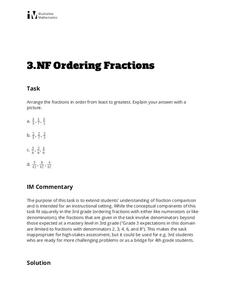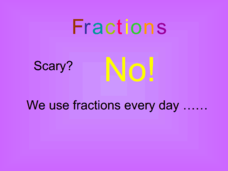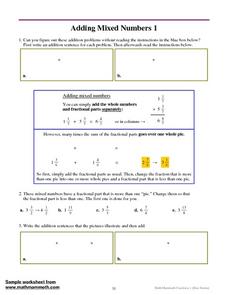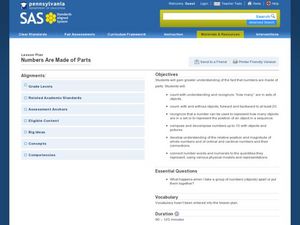Illustrative Mathematics
Ordering Fractions
Here is a comparing and ordering fractions learning activity that extends young mathematicians understanding of fractions with like and non-like denominators. By representing and explaining each fraction in a picture or diagram, students...
EngageNY
Matrix Addition Is Commutative
Explore properties of addition as they relate to matrices. Using graphical representations of vector matrices, scholars test the commutative and associative properties of addition. They determine if the properties are consistent for...
Curated OER
Fractions
Fractions are scary for a lot of young mathematicians. This cute presentation tries to take the "scary" out of fractions. The basics are covered: the numerator, the denominator, and the fact that a fraction is a representation of a part...
Institute of Electrical and Electronics Engineers
Exploring at the Nanoscale
Nano-nano! Nanotechnology can seem like it's from another planet! After learning about this tiny technology, collaborative groups experiment with how smaller particles affect chemical reactions. They do this by immersing a whole and a...
Curated OER
Percent Box
Students examine the procedures to determine a number when the percentage of the whole is known or to find the whole number when the part or percentage is known.
Curated OER
Technology Lesson Activity: Fractions
Fifth graders practice using the English measuring system by creating fractions. In this parts of a whole lesson, 5th graders combine math key bars to simulate small parts of a bigger item. Students combine the pieces to...
Curated OER
To Be (Half) Or Not To Be (Half)
First graders demonstrate various ways to represent and verify a whole or set separated in two, three, or four equal parts. Using interlocking cubes, Students model a part of a whole or a part of a set. They use appropriate tools and...
Curated OER
Mixed Numbers Practice
In this mixed number learning exercise, students write improper fractions and mixed numbers for shaded parts, use a number line to help write mixed numbers, find missing numbers and complete 2 test prep questions. Houghton Mifflin text...
Curated OER
Add Mixed Numbers with Like Denominators
In this mixed numbers worksheet, students add mixed numbers with like denominators. Students complete 7 problems on 10 pages total.
Curated OER
Adding Mixed Numbers 1
In this adding mixed numbers learning exercise, students write addition sentences using pie charts, add mixed numbers with the same denominator, and write mixed numbers as fractions in simplest form. Students solve nine problems.
Curated OER
Multiplication Two Digit by Three Digit Numbers
In this multiplication worksheet, students multiply two digit numbers by three digit numbers. Students complete 30 multiplication problems.
Curated OER
Mystery Stars: Estimating Whole Numbers Using Fractions Shown on Sectors of a Circle
In this set of fraction worksheets, learners cut out 6 pages of circles that show fractions with stars covering different sections of circles. They show one section of the circle in order to estimate the whole number of stars by looking...
Curated OER
The Math Of African Music
Students practice rhythms and fractions on African drums in this Music lesson mixing Math skills and music notation. The lesson also includes ideas for assessment and state and national benchmarks met.
Pennsylvania Department of Education
Numbers Are Made of Parts
Children play with barnyard animal cards to practice composing and decomposing numbers. With their "secret number" of animal cards in a cup, they shake and spill them onto a barn story board, counting how many animals fall in the barn...
Curated OER
Properties of Real Numbers
In this Algebra II worksheet, students classify numbers by naming the subset or subsets of the real numbers to which it belongs. The two page worksheet provides explanation and examples in addition to ten practice problems. Solutions are...
Curated OER
Graphing Calculator Activity: Multiplying and Dividing Mixed Numbers
In this graphing calculator worksheet, students explore necessary steps to multiply and divide mixed numbers using a graphing calculator. In groups, students measure objects in their classroom and write equations using their collected...
Illustrative Mathematics
Factors and Common Factors
This is an exercise in finding the greatest common factor of two whole numbers. Use in direct instruction or as part of your guided practice. Make up additional problems for home work. It also can be used as a mini-assessment or test...
Curated OER
Workplace Math Skills Assessment
In this math worksheet, students take an assessment of real life math problems relating to construction. The test involves whole numbers only using all operations.
Curated OER
Unit II - Version 6.0 - Worksheet 1 - Fractions
In this fraction learning exercise, learners determine the number of parts in a whole. They add and divide fractions. This one-page learning exercise contains 11 problems.
Illustrative Mathematics
Operations on the Number Line
A different way to look at integers is on this number line with variables in place of numbers. Learners are to look at different expressions and describe why they think the answer would be positive or negative, depending on the location...
EngageNY
Scientific Notation
Young mathematicians learn how scientific notation is meant to save time. Part 10, out of a series of 15, asks scholars to recognize the correct use of scientific notation and finish by adding and subtracting numbers using...
Illustrative Mathematics
Building toward fluency
Here is a great learning task that focuses on the development of areas in computational fluency including strategies in mental math. Young learners are guided through a list of addition expressions that help them visually understand the...
Common Core Sheets
Comparing Numerically (Different Denominator)
Compare fractions with different denominators in a handy Common Core based activity. Fourth graders decide which fraction is larger or smaller based on the parts that make up a whole (denominator) and the parts being described...
Curated OER
How Many?
Establish 1:1 correspondence by counting students, first one gender, then the other. Give each child a colored cube (one color for boys, another for girls) and have small groups determine more or less and how many all together. As a...























